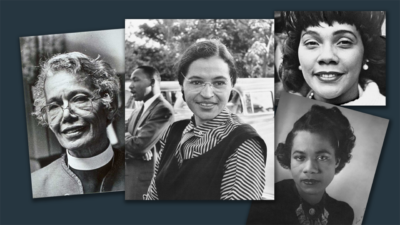
Black women worked as hard as the Rev. Martin Luther King, Jr. and his male contemporaries to make his dream come true. Coretta Scott King, Rosa Parks, Adelene McBean, and Pauli Murray fought for dignity and justice.
Racial Justice & Religion Collective members will make a pilgrimage to Birmingham and Montgomery, Ala., which became epicenters for the Black civil rights movement, from Oct. 1-5.
Birmingham and Montgomery were home to women who became wives, and young women were denied the right to life, liberty, and the pursuit of happiness.
Coretta Scott King
Fighting for liberation has never been just a man’s job. Scott King stressed that sentiment in a January 1966 New Lady Magazine article, calling out sexism in the Civil Rights movement.
“Not enough attention has been focused on the roles played by women in the struggle,” she said, in part.
Scott King wasn’t a pastor’s wife who was seen and rarely heard. She used her voice to help create change. Scott King, a talented singer, performed during an April 1958 Omicron Lambda Chapter of Alpha Phi Alpha fraternity-sponsored concert at Peter High School in Birmingham, Ala. She used the performance to stress the need to fight for Black civil rights.
However, the singer also became an advocate on the world stage. Scott King served as a Women’s Strike for Peace Conference delegate in Geneva, Switzerland, in April 1962. Scott King also attended the Women’s Strike for Peace Rally in New York City in early November 1963.
Scott King spoke out at an anti-war demonstration in Central Park on Apr. 27, 1968, in place of Dr. King just weeks after his assassination. Scott King stressed it’s inconceivable a prosperous nation like ours “should be blighted by poverty, disease, and illiteracy.” Scott King used notes taken from Dr. King’s pocket.
Scott King founded the King Center for Nonviolent Social Change in Atlanta. She served as the center’s president and CEO until she passed the mantle to her son, Dexter Scott King. Rosa Parks’ participation in the Montgomery Bus Boycott paved the way for Scott King.
Rosa Parks
History books have described Rosa Parks as a tired seamstress who refused to give up her seat on a Montgomery city bus to a white rider. That oversimplified the stand she took on Dec. 1, 1955. Parks defied the bus driver’s order to give up her seat in the “colored” section.
Interestingly, this had been Parks’ second run-in with bus driver James Blake. She’d boarded his bus in 1943 and paid the fare before he demanded she exit and enter the back door. When Parks got off the bus, Blake left her behind.
While Parks might’ve been a tired seamstress, she was also a longtime civil rights activist. Her husband, Raymond, was a barber from Montgomery and a member of its NAACP chapter. Parks joined and eventually became chapter secretary, a role she held until 1957.
Adelene McBean and Pauli Murray shared Parks’ passion for confronting injustice. However, McBean and Murray challenged segregated busing nearly 20 years before Parks.
Adelene McBean & Pauli Murray
An uneventful bus journey from New York City to Durham, N.C., in March 1940 turned into quite an adventure. McBean and Murray settled into seats in the back of the bus until it became unbearable, Murray shared in her memoir, Song For A Weary Throat: Memoir of An American Pilgrimage.
After the careening bus left McBean in pain, she suggested they take the two empty seats behind the driver. However, Murray asked the driver if he could move two white riders to the empty seats. Therefore, McBean and Murray could occupy those seats. The driver wasn’t interested.
“The driver shoved me backward with an impatient elbow and told me to get out of his face and take my seat. I tried once more to explain the situation, but the driver said curtly he would not change seating arrangements until we stopped in Petersburg,” Murray wrote.
Upon arrival in Petersburg (Va.), they took matters into their own hands and moved up a row as new passengers waited to board. Once the driver noticed them, he began demanding they move back. Even with the threat of arrest, McBean stood her ground, but was spared.
Their luck ran out, when Murray and McBean were arrested for disorderly conduct and creating a public disturbance, after calling out the bus driver for clear discrimination. They sat in the Petersburg City Jail from Saturday through Tuesday before being convicted on the original charges of violating Virginia segregation laws. McBean and Murray were later released on bail.
Four Little Girls
Scott King, Parks, McBean, and Murray consciously engaged in the civil rights movement. However, four little girls–well, five–at the 16th Street Baptist Church in Birmingham were only focused on being little girls on Sept. 15, 1963, when a bomb ripped into the church and killed them.
That evil act left Sarah Collins Rudolph without a sister, three friends, and her right eye. She also became a forgotten victim of heinous racial violence.
As the Collective members make this pilgrimage to Birmingham and Montgomery, may the spirits of those ancestors and the presence of Rudolph Collins inspire them. While Black men made significant contributions to the civil rights movement, Black women made sacrifices in the name of liberation.

